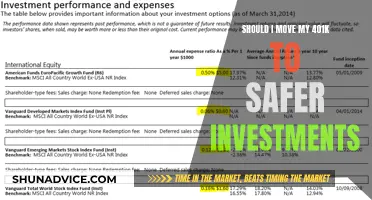
There are several factors to consider when deciding whether to manage your investments or to enlist the help of a financial advisor. Firstly, it is important to understand what it means to manage your own investments. This can range from day trading, which is the most active form of self-directed investing, to adopting a more passive approach by putting your investment dollars into a single target date fund. Trusted sources, such as money expert Clark Howard, recommend a long-term, low-cost investment strategy. This can be achieved through target date funds or a mix of index funds, which provide complete diversification without the need for a paid professional. Managing your own investments can be gratifying, give you more control, and result in lower fees.
However, it is important to consider the disadvantages of self-directed investing. It can be emotionally challenging to watch your portfolio lose money and requires the discipline to avoid making impulsive decisions. Additionally, managing your own investments can be more work and carries a greater risk.
As an alternative, you can opt for a robo-advisor or hire a financial advisor. Robo-advisors are automated investment platforms that construct portfolios based on factors such as your age, risk tolerance, and retirement timeline. They typically charge an annual fee of around 0.25% and aim for steady returns over time. Financial advisors, on the other hand, are paid professionals who provide financial planning advice and help manage your money. They assess your financial situation, goals, and create a comprehensive plan. The cost of hiring a financial advisor can vary, but it is important to be mindful of exorbitant fees.
Ultimately, the decision to manage your own investments or seek professional help depends on your individual circumstances, risk tolerance, and the amount of time and effort you are willing to dedicate to investing.
| Characteristics | Values |
|---|---|
| Definition | A managed account is an investment portfolio that a financial expert oversees on behalf of a client. |
| Who is it for? | Managed accounts are for people who want to benefit from a private investment manager's professional expertise. |
| Who is involved? | The client, the financial advisor, and the investment manager. |
| Investment types | Stocks, bonds, financial assets, cash, property titles, etc. |
| Investment decisions | The investment manager has discretionary authority to make investment decisions relating to the owner's goals and needs, asset size, and risk tolerance. |
| Investment goals | Long-term growth, current income, etc. |
| Investment minimums | Managed accounts typically have substantial minimum investment requirements, often a six-figure amount. Some start at $250,000, $100,000, $50,000, or $2,000. |
| Fees | Managed accounts have annual fees that vary based on the manager and the size of the portfolio. The most common fees are 1% and 2% of assets under management (AUM). |
| Advantages | Professional supervision, customized financial advice, capital appreciation, reduced tax burden, transparent transactions. |
| Disadvantages | High minimum investment, restricted access to assets, annual fees, potential underperformance due to higher fees, lack of transparency, time required for personal data entry and updates. |
| Alternatives | Robo-advisors, full-service financial advisors, mutual funds, self-directed accounts. |
What You'll Learn

Advantages of self-directed investing
Self-directed investing gives you full control over how you invest your money. You have the freedom to buy a wide range of securities, including individual stocks, bonds, funds, and derivatives, or allocate your money as you see fit. This level of control allows you to customize your portfolio to align with your needs and goals.
- Lower costs: With self-directed investing, you don't pay any management fees or other costs associated with having someone else manage your investments. At most, you'll pay commissions and mutual fund or ETF expense ratios, which tend to be lower than management fees.
- Access to a wider range of investments: Self-directed investing provides access to a broader array of financial products, including derivatives, futures, crypto, and more. This allows for a more diversified portfolio.
- Flexibility: Self-directed investing is much more flexible in terms of the strategies you can use and how you can invest. You have the freedom to invest in specific stocks and bonds or use derivatives such as options or futures.
- Gratification: Managing your own investments can provide a sense of gratification and pride in accomplishing something challenging.
- Ability to pick individual stocks: Self-directed investing allows you to devote an appropriate percentage of your portfolio to individual stocks without feeling guilty, as fractional shares and brokerages with zero account minimums make it possible to control the amount invested.
- Ease of use: Thanks to technological advancements, managing your own investments is now easier than ever. Various online trading platforms and tools are available to help you make informed decisions and stay organized.
While self-directed investing offers these advantages, it's important to remember that it also carries higher risks and requires more time and effort for research and portfolio management.
Strategizing a Balanced Investment Portfolio at 67 Years Old
You may want to see also

Disadvantages of self-directed investing
Self-directed investing can be a great way to create passive income, but it also has its disadvantages. Here are some of the drawbacks of self-directed investing:
Time Commitment
Self-directed investing requires a significant time investment. Beyond the regular management of your portfolio, such as rebalancing or buying and selling shares, you'll need to spend time researching investment opportunities. This research can be fun for some people, but it also takes a lot of effort and knowledge. It is important to continuously monitor your own behaviour to ensure that you are maintaining a rational investment strategy.
Higher Risk
Self-directed investing carries a higher risk as the responsibility of investment decisions rests solely with the individual. The likelihood of lower returns is far more probable, as it is incredibly hard to beat the market on a consistent basis. Fewer than 10% of actively managed mutual funds beat the market regularly, and these are managed by teams of highly experienced professionals.
Emotional Attachment
It is easy for self-directed investors to get attached to investments that they have studied and chosen. This can lead to overconcentration on one investment or holding onto it for too long, which often has dire consequences.
Fees
Although self-directed investing does not come with management fees, the likelihood of lower returns is far more probable. In addition, self-directed investors are more likely to sell winning stocks within a year of buying them, triggering short-term capital gains taxes.
Less Personalised
Self-directed investors may not be able to create a portfolio that perfectly matches their needs and goals, as they do not have access to the same tools and resources as financial advisors.
Strategies to Optimize Your Investment Portfolio's Performance
You may want to see also

Advantages of managed accounts
There are several advantages to having a managed account, where a professional investment manager makes decisions according to the client's goals, needs, asset size, and risk tolerance.
Firstly, managed accounts offer readily available investment experience. Money managers are well-informed about the financial industry, which helps them make consistent investments that benefit their clients. Their experience in money management assists them in deciding where to allocate money and assets. They may also record the historical performance of an investment to help measure any changes in the value of a client's assets and funds.
Secondly, managed accounts offer tested investing methods and customized financial advice. Money managers typically follow a specific process for investing and may provide tailored financial advice based on the type of investing method used. They use effective communication to share their ideas on how to grow an investment with a client.
Thirdly, managed accounts can lead to capital appreciation. Money managers can purchase assets for clients and monitor the market until their value increases, leading to a profit when sold.
Additionally, managed accounts provide professional management. Money managers have extensive experience in measuring the risks and benefits of specific investments by analyzing the market. This helps them build effective portfolios for investors, reducing stress and providing confidence in the security and growth potential of the managed account.
Finally, the biggest advantage of a managed account is hiring professionals who manage portfolios full-time. They can research and understand the markets at a higher level, allowing them to make sound investment decisions. They are more experienced in successful investing strategies, such as rebalancing and diversification, ensuring better outcomes for their clients.
Invest Your Savings Wisely: A Guide for Nigerians
You may want to see also

Disadvantages of managed accounts
While managed accounts offer many benefits, such as professional management, tailored advice, and industry knowledge, there are also some disadvantages to consider.
One of the most significant drawbacks is the high minimum investment requirement, often starting at $250,000, which may restrict some individuals from opening an account. This is a significant amount of money, and as a result, managed accounts are typically used by high-net-worth individuals.
Another disadvantage is the annual fee structure. Account managers typically charge an annual fee based on a percentage of the assets under management (AUM). These fees can impact the overall returns, especially for larger portfolios, as the fees are usually calculated as a percentage of the total value of the assets.
Additionally, managed accounts may offer restricted access to assets. It can take several days for clients to invest or withdraw money from their accounts, which can be inconvenient if quick access to funds is required.
The time it takes to process investment activity is also a potential drawback. The investment activity in managed accounts can be slow, and it may take days for the money to be fully invested. This could be due to specific time demands for selling assets or the need to wait for the client to provide the full amount of money required.
Furthermore, the complexity and lack of transparency of managed accounts can be off-putting to some investors. The investment strategies and models used by managers may be complicated and difficult to understand for those without a financial background.
Lastly, the potential for significant losses exists if market changes negatively impact the portfolio. While professional managers aim to maximize returns and minimize risks, there is always the possibility of substantial losses, especially if the chosen strategy is ineffective or the market conditions turn unfavorable.
Taxable Investment Portfolio: Diversification Strategies for Long-Term Growth
You may want to see also

Alternatives to self-directed investing
If you decide against managing your own investments, you can choose from several alternatives, including:
- Robo-advisors: These are automated investment platforms that construct your portfolio based on your age, risk tolerance, and retirement timeline. They typically invest in low-cost ETFs, mutual funds, bonds, and other diversified assets. While robo-advisors don't aim to beat the market, they offer a good balance between risk and steady returns. Their management fees are usually around 0.25%, plus the expense ratios of the underlying funds, which are often below 0.2%.
- Financial advisors: Financial advisors are paid professionals who provide financial planning advice and help manage your money. They assess your debts, assets, and goals to create a comprehensive financial plan. In addition to investment management, they can advise on tax strategies, retirement plans, and more. The cost of financial advisors varies, but an unofficial benchmark is 1% for 2023.
- Managed accounts: A managed account is a portfolio of stocks, bonds, or a combination, overseen by a professional investment manager. The manager has discretionary authority to make investment decisions based on the client's goals, needs, asset size, and risk tolerance. Managed accounts often have substantial minimum investment requirements, typically starting at $100,000, and come with transactional fee structures. The manager's annual fee is usually 1-2% of the assets under management (AUM).
- Mutual funds: Mutual funds are a type of managed account where a professional money manager is hired by the fund company to oversee investments in the fund's portfolio. Mutual funds have been popular among small retail investors as they provide access to advanced portfolio management and professional expertise. They have lower initial investment requirements compared to managed accounts and transactions are faster, as assets can be bought and sold daily.
When choosing between self-directed investing and alternatives like robo-advisors or financial advisors, consider your comfort level with the stock market, the level of customization you need, and whether you enjoy the research and management aspects of investing.
Portfolio Investments: A Downward Trend and Its Implications
You may want to see also
Frequently asked questions
A managed investment account is a portfolio of stocks, bonds, or a combination of both, that is owned by a single manager. The investor hires a professional investment manager to oversee the account's operations to achieve specific objectives, such as long-term growth or current income.
The advantages of a managed investment account include readily available investment experience, professional supervision, reduced tax burden, and transparent transactions.
The disadvantages of a managed investment account include high minimum investment requirements, restricted access to assets, and annual fees.
When choosing between a managed account and a self-directed account, consider the level of expertise, time commitment, and emotional discipline required for managing your own investments. Managed accounts offer professional expertise and a reduced time commitment, while self-directed accounts provide greater control and potentially lower fees.







